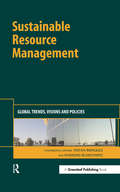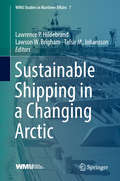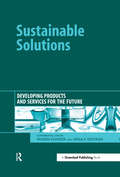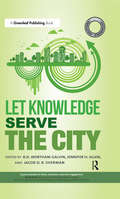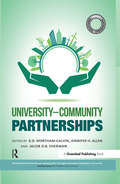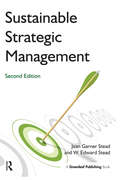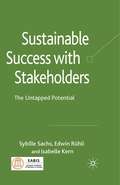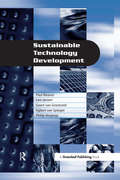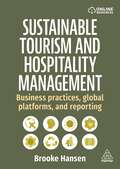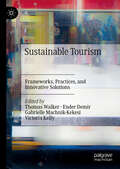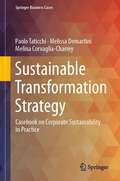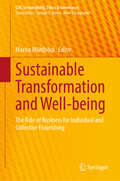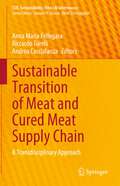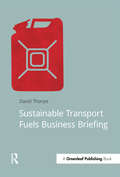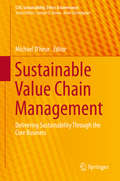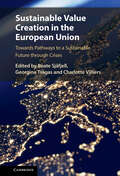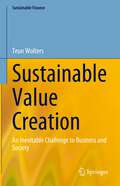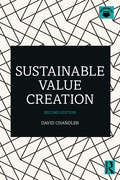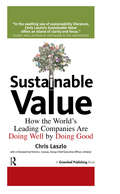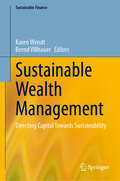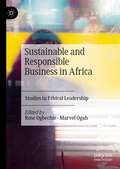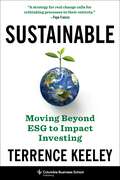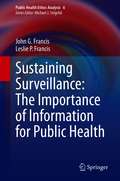- Table View
- List View
Sustainable Resource Management: Global Trends, Visions and Policies
by Raimund Bleischwitz Stefan BringezuSustainable Resource Management is the result of years of exhaustive research by Germany's Wuppertal Institute. Looking at material flows, industrial and societal metabolism and their implications for the economy, this important new book provides radical perspectives on how the global economy should use natural resources in intelligent ways that maximise well-being without destroying life-supporting ecosystems. It presents a vision of the future and the fundamental elements necessary for the sustainable management of the Earth's resources. It argues that the need to manage the use of our natural resources at a sustainable level can be shaped into a great opportunity for innovation and for new institutions to govern change.Sustainable Resource Management first provides an overview of the methods it has used to analyse the physical basis of our economies, from the product and firm level through to sectors and whole countries, considering material flows and life-cycle-wide impacts on the environment. Indicators are described that reflect the volume, structure and physical growth of the socio-industrial metabolism, resource productivity and the share of domestic and foreign resource use. By accounting for the global land use of different countries and regions, the book aims to better assess the global implications of domestic activities. For example, linkages are made between the consumption of food and non-food to land use change, such as the expansion of cropland at the expense of natural ecosystems.Sustainable Resource Management presents a number of key findings. Comparing the resource use of the EU with the USA, Japan and China, it determines why there is a difference. It provides evidence about the decoupling of resource use from economic growth, at the expense of an increased reliance on foreign supply. There are two closely analysed case studies, on platinum group metals (PGM) and biofuels, which provide insights into the key drivers of resource use and related problem shifting. Another key finding is that only a limited number of sectors, both on the production and consumption side, are actually associated with major resource requirements and atmospheric emissions – so synergies between resource conservation and climate protection can be found. Evidence is also given of a possible link between a low level of resource productivity and a high risk of unemployment.Sustainable Resource Management also looks into the future and provides visions of sustainable resource use, including the necessary conditions for a sustainable metabolism in the EU. Four example-rich visions are laid out approaching the future from different angles: the resource-efficient and recycling-based industry, the steady-stocks society, the solarised technosphere, and the balanced bio-economy. Each examines key conditions for a low-risk and high-opportunity future, while accounting for likely trade-offs between dematerialisation and rematerialisation, between renewable energy sources and non-renewable materials, between construction and deconstruction of buildings and infrastructures, and between domestic production and the import of biomass products.Finally, Sustainable Resource Management provides a blueprint for how a more sustainable future may be achieved. It analyses the legitimacy of public policies for sustainable resource management, looks at market deficits and barriers, and considers the global nature of the challenge. Crucially, it lays down the key elements of a strategy roadmap: First, better information, dissemination and knowledge generation. Second, innovative market policies to encourage new business models. Third, industry-specific policies – particularly where current resource use patterns are significant and a huge demand for adaptation and system innovation exist, such as in automotive or metal production. Last but not least, an international convention on sustainable resource management is proposed.This significant new book will be essential reading for researchers, EU and national governmental officials; and business and NGOs
Sustainable Shipping in a Changing Arctic (WMU Studies in Maritime Affairs #7)
by Lawrence P. Hildebrand Lawson W. Brigham Tafsir M. JohanssonThis volume brings together multiple perspectives on both the changing Arctic environment and the challenges and opportunities it presents for the shipping sector. It argues for the adoption of a forward-looking agenda that respects the fragile and changing Arctic frontier. With the accelerated interest in and potential for new maritime trade routes, commercial transportation and natural resource development, the pressures on the changing Arctic marine environment will only increase. The International Maritime Organization Polar Code is an important step toward Arctic stewardship. This new volume serves as an important guide to this rapidly developing agenda. Addressing a range of aspects, it offers a valuable resource for academics, practitioners, environmentalists and affected authorities in the shipping industry alike.
Sustainable Solutions: Developing Products and Services for the Future
by Martin Charter Ursula TischnerToughening environmental legislation, national and supra-national environmental product policies and growing customer demands are focusing the attention of companies on the environmental and broader social issues linked to the creation and delivery of their products and services. There is now an urgent need for appropriate management structures, practical tools and increased awareness among all stakeholders in the product development process and throughout the entire product life-cycle. These are huge issues – with major implications for corporate management, design and production strategies. Sustainable Solutions provides state-of-the-art analysis and case studies on why and how cutting-edge companies are developing new products and services to fit "triple-bottom-line" expectations. The book is split into three sections: first, the broad issues of business sustainability are examined with focus on sustainable production and consumption and consideration of North–South issues. Second, the book tackles the major methodologies and approaches toward organising and developing more sustainable products and services. Third, an outstanding collection of global case studies highlights the progress made by a wide range of companies toward dematerialisation, eco-innovation and design for durability. Finally, the book collects together a comprehensive list of web addresses of useful organisations. Practical and comprehensive, Sustainable Solutions will be essential reading for corporate managers, product designers, R&D staff, academics and all individuals interested in a definitive source on how new product and service development can and is contributing toward tacking the challenge of sustainable development.
Sustainable Solutions: Let Knowledge Serve the City
by B.D. Wortham-Galvin Jennifer H. Allen Jacob D.B. ShermanPortland, Oregon. Sustainability might not seem glamourous, but Portland is making a name for itself as one of the most sustainable cities in the world. Whether you’ve heard about the farmers’ markets, the cycle-friendly streets or the ongoing efforts to balance livability and equity, Portland is leading the way in urban sustainability: this book helps us understand how it achieves this.A critical component of Portland’s success is collaboration between different communities and institutions; the Sustainable Solutions series examines higher education’s role in these partnerships. In exploring how best to “let knowledge serve the city”, Portland State University translates its founding motto from mere words to applied research and action.This first volume examines different approaches to collaborative work that PSU has taken, both within the university and with community partners: how have barriers been overcome between different areas of study, between academia and the public, and why is bridging these divides so important? It also introduces the themes of the engaged university, social justice, climate change and sustainable economic development, which shape PSU’s work.Let Knowledge Serve the City is ideal for anyone seeking best practice in connecting students and universities with the needs of local communities. From public interest design and student leadership, to food justice and age-friendly development, authors combine academically rigorous theories of sustainability and community-university partnerships with lessons learned on how to realize ideals of sustainable development.
Sustainable Solutions: University–Community Partnerships (Sustainable Solutions Ser. #2)
by B.D. Wortham-Galvin Jennifer H. Allen Jacob D.B. ShermanWhat is the role of the university? Current systems may stress research output, but Wortham-Galvin, Allen, and Sherman seek to re-establish the importance of teaching and service in the work of the 21st-century university. The Sustainable Solutions series shares Portland State University’s experience of community-engaged teaching and research. With a focus on sustainability, we see that such collaboration is vital to making Portland one of the world’s most sustainable cities.Volume 2, University–Community Partnerships, builds on the themes introduced in Volume 1, Let Knowledge Serve the City, to explore how these partnerships play out in practice. Covering 13 projects, which range from supporting local artisans and researching food access, to sharing Indigenous history and decolonizing perceptions of knowledge, readers receive pragmatic advice on working with community organizations. Authors also offer critical reflection on how theories of engagement have structured PSU’s work and how their findings impact our very understanding of partnership.This reader-friendly text provides an ideal introduction to anyone wishing to learn more about models of effective collaboration and how to put these into practice. Explained through the context of specific projects, the book offers both inspiration and practical guidance to anyone — in local government, academia, or the third sector — looking to set up productive community–university partnerships.
Sustainable Strategic Management
by Jean Garner Stead W. Edward Stead“Sustainable strategic management” refers to strategic management policies and processes that seek competitive advantages consistent with a core value of environmental sustainability.This book has been specifically written as a text to augment traditional graduate and undergraduate management courses on strategic management. It fills the need for a strategy text that gives full attention to sustainability and environmental protection. The authors have structured the book to follow the usual order of topics in any standard management text. Sustainable Strategic Management also features an on-going, chapter-by-chapter case study (Eastman Chemical Company) that exemplifies many of the principles of environmentally sound management practices.From creating organizational visions, to formulating goals and strategies, to strategy implementation and evaluation, this book provides readers with new ways of thinking about their organization’s role in the greater society and ecosystem. From the Authors’ Preface:Ours is the first book to integrate sustainability into strategic management. It covers the full gamut of strategic management concepts and processes that would be expected in any quality strategic management book, and it does so in a way that thoroughly weaves sustainability into each and every one of them. Students using this book understand such things as: why reducing materials and energy intensity is an effective functionallevel strategy, why socially differentiated products command premium prices, and why a business ecosystem pursuing a vision of social and ecological responsibility can dominate its market. Further, because the book is relatively short, reasonably priced, and very thorough in its coverage of strategic management concepts and ideas, it can be used either as a stand-alone text for graduate and undergraduate strategic management courses, as a supplement to another book, or as one of a group of short texts.
Sustainable Success with Stakeholders
by Sybille Sachs Edwin Ruhli Isabelle KernThis book shows managers how they can identify their stakeholders and cooperate with them in a mutually successful and satisfying way. It includes numerous examples from case studies and international firms, illustrating the stepping stones to a comprehensive stakeholder management.
Sustainable Technology Development
by Leo Jansen Paul Weaver Philip Vergragt Geert van Grootveld Egbert van SpiegelIn the time it takes to read this sentence, about fifteen people will be added to the world's population. Read the sentence again, and there will be thirty. Tomorrow, each of these people will be demanding greater prosperity. Production and consumption are increasing fast but will have to grow even faster in the future to keep up with population growth and a world increasingly divided by inequality. How should we react to these trends? Certainly, many use growth figures to forecast disaster. But there is an alternative vision: one of a sustainable future, in which growth is seen not as a threat, but as the driving force behind innovation. This is the scenario worked out in the Netherlands by Sustainable Technology Development (STD), a five-year programme of research and "learning-by-doing" based on setting up new innovation networks and working with new methods to search for sustainable technological solutions. In order to make sustainability tangible, STD made a leap in time. What human needs will have to be satisfied fifty years from now? Taking a sustainable future vision as a starting point, STD demonstrated what steps we should take today for new technologies and systems to be in place in time. These results are now available for the first time in a comprehensive, specifically written English-language book, together with a description of the unique working method of STD and the results and key lessons from a set of the programme's illustrative case studies. This book serves as a manual for industry, governments and social leaders wanting to prepare themselves for a sustainable future. Sustainable Technology Development sets out the programme's underpinning philosophy and describes its approach, methods and findings. Delivering sustainability means finding ways to meet human needs using a fraction of the natural resources we use today. The world's richer nations would be wise to target at least ten-fold improvements by 2050 in the productivity with which conventional natural resources and environmental services are used. And they need to bring new, sustainable resources on-stream to augment the resource base and replace the use of unsustainable alternatives. Sustainable Technology Development marks a significant contribution to our understanding of innovation processes and how these might be influenced in favour of sustainable technology development. In principle, technology could play a pivotal role in sustainable development. Whether it does or not depends on whether innovators can be encouraged to make this an explicit goal, adopt long-term time-horizons and search for renewable technologies. Given the long lead-times involved, there is no time to waste in beginning the search. The STD programme has begun to make inroads into one of the most urgent of all needs concerning sustainable development: that for innovation in the innovation process itself.
Sustainable Tourism Contracts
by Sara LandiniThis book addresses the various sustainability issues that the tourism industry has faced over time like the trend from over-tourism to under-tourism or from tourism in increasingly distant destinations to a new local tourism with new needs. It also highlights how contracts, both between businesses and those with consumers, can represent tools for the financial, ecological and social sustainability of the tourism industry.
Sustainable Tourism and Hospitality Management: Business Practices, Global Platforms, and Reporting
by Dr Brooke HansenSustainable Tourism and Hospitality Management is a practical textbook to understand how travel businesses engage and comply with sustainable business practices including how to measure, monitor and report on sustainability initiatives.This textbook is ideal for postgraduate students studying sustainable tourism and development to help prepare them for future careers in tourism and hospitality management.Sustainable Tourism and Hospitality Management:- Looks at viable ways travel businesses can implement more sustainable practices- Provides an overview of the current global certifications for sustainability benchmarking- Explores best practices and challenges unique to the travel industry - Includes real-world examples from Marriott, the Global Sustainable Tourism Council, Ecotourism Australia and the Sustainable Tourism Association of HawaiiIn-text learning features include learning outcomes, best practice tips from industry leaders and reflective questions, supported by online resources such as PowerPoint lecturer slides.
Sustainable Tourism: Frameworks, Practices, and Innovative Solutions
by Thomas Walker Victoria Kelly Ender Demir Gabrielle Machnik-KekesiThis edited volume aims to ignite an academic discussion regarding necessary, and urgent, adaption and mitigation strategies for the tourism industry. Now more than ever, there is a need for designing and implementing concrete strategies for a world in which tourism practices are sustainability-minded, not only to rescue this key industry from the devastating effects of the COVID-19 pandemic, but also to limit the effects that it has on pollution, climate change, and at-risk populations. Achieving this goal will require innovations that can help us synchronously adapt to committed change as well as shift our planning processes and alter our behaviours. Including contributions from international experts in the fields of tourism management, economics, political science, finance, business, and sustainability, this book provides much-needed research on sustainable tourism by evaluating current and future trends, global contributions, case studies and new research evaluating issuessuch as over-tourism and under-tourism, as well as the general effects that tourism have on a region’s economy, environment, culture, and society. In addition, it will explore how sustainable tourism can help alleviate, mitigate, or control these problems. This book aims to provide insight into how we can still enjoy and benefit from touristic travel while implementing appropriate strategies and adaptation plans in the areas of health, culture, the economy, and the environment and showcase investigations of alternative tourism frameworks and tourist perspectives. It will be of great interest to academic and practitioner communities in business and policy, as well as economics, tourism management, development studies, finance, cultural heritage management, policymaking and entrepreneurship.
Sustainable Transformation Strategy: Casebook on Corporate Sustainability in Practice (Springer Business Cases)
by Paolo Taticchi Melissa Demartini Melina Corvaglia-CharreyThis casebook demonstrates how companies can design and execute corporate sustainability strategies into their overall business strategy to achieve sustainable transformation. It offers a set of case studies from different industrial sectors such as aerospace and defence, beauty, energy, engineering and construction, fashion retail, financial services, food and hospitality, life sciences, motorsports, pharmaceutical, software, toy production. Each story presents practical and concrete actions taken by companies to develop their sustainability strategies, as well as challenges and issues faced during the process. Concluding with best practices emerging from the cross-case analysis, this book is beneficial for sustainability and management professionals, students and scholars.
Sustainable Transformation and Well-being: The Role of Business for Individual and Collective Flourishing (CSR, Sustainability, Ethics & Governance)
by Marisa MühlböckIn an era of undeniable human impact on the planet, can business drive sustainable development and enhance well-being for all? This book explores the evolving concept of well-being through a transdisciplinary lens, bridging sustainability, business, and collective flourishing. It examines the business sector's transformative role in promoting well-being through sustainable practices. Featuring insights from diverse disciplines and cultures, the book provides case studies, strategies, and resources for entrepreneurs and managers to achieve well-being in work and life. With contributions from leading scientists, it maps the current landscape, identifies gaps, and sparks new research on linking individual, societal, and planetary well-being. A must-read for those seeking to understand how business can foster a sustainable, well-being-driven future.
Sustainable Transition of Meat and Cured Meat Supply Chain: A Transdisciplinary Approach (CSR, Sustainability, Ethics & Governance)
by Anna Maria Fellegara Riccardo Torelli Andrea CaccialanzaThis edited volume provides an innovative perspective on the future of food systems. The contributors analyse relevant issues for a sustainable and responsible food consumption and cover fundamental steps for a broader approach to the sustainability of meat-based products. The book presents several issues and solutions to engage food firms in a measurable ecological transition. Topics discussed include not only the pedagogical perspective on sustainable food consumption, the evolution of (meat-based) food production systems and the animal welfare perspective, but also the adaptation of firm’s strategies to the sustainable transition, the effects of climate change on agri-food firms’ governance structures and the evolution of consumers perceptions on meat-based products and the role of CSR labels. This book targets managers and entrepreneurs who work in the meat industry and are seeking to improve their socio-environmental performance and governance, accountants that works at the production of sustainability reports for food companies, researchers working at the cutting edge of the food and environmental fields, professionals working in the meat industry and researchers interested in the investigation of novelties in European food regulation.
Sustainable Transport Fuels Business Briefing
by David ThorpeSustainable Transport Fuels Business Briefing explains, for a global business audience, the latest developments in the world of sustainable transport. Not the vehicles or modes of transport themselves, but their means of propulsion.New technologies and players are coming and going with bewildering speed. Some observers are putting their money on electric vehicles, others on hybrids; some see electric vehicles as a mere stepping stone to hydrogen-powered fuel cell vehicles, already being seen on city streets. The mere mention of biofuels often provokes fierce arguments about their sustainability, yet they, too, are here to stay and will be filling more and more fuel tanks.By the time you finish this book, you will understand not only the pros and cons of all these technologies, the programmes around the world furthering their development, and the players large and small, but also the catalysts for change, and the successful partnerships and innovative business models being employed.You’ll be able to make informed decisions about investments, whether you’re considering a new fleet, haulage or mobility of any kind, or whether to install an electric vehicle charging point in your property.
Sustainable Urban Development in the European Arctic (Routledge Studies in Sustainable Development)
by Dorothea Wehrmann Michał Łuszczuk Katarzyna Radzik-Maruszak Jacqueline Götze Arne RiedelFocusing on cities in the European Arctic, this book consolidates research on sustainable development, local and urban governance, and transnational cooperation in the region. It examines to what extent there is transnational cooperation between urban areas in remote locations and how it can be enhanced to better align with global sustainable development policies to successfully implement goals such as the 2030 Agenda for Sustainable Development and the Paris Climate Agreement. Based on field research in seven cities in the European Arctic, Rovaniemi, Kolari, Nuuk, Akureyri, Tromsø, Kiruna, and Luleå, the authors explain why approaches to sustainable urban development differ between geographies, how policies relate to other local and global strategies, and to what degree the European Arctic is normative for remote regions at large. This book contributes to important conceptual debates on local governance and transnational cooperation by examining the benefits and potential issues of applying theoretical models of multi-actor engagement and participation in isolated populations. It argues that the participation of local actors in decision processes may encourage a better harmonisation of sustainable urban development approaches in the European Arctic and will have a greater impact at the global level if aligned transnationally. This book will be relevant to researchers, social scientists, policymakers, practitioners, and NGOs in the fields of global governance, sustainable development, sustainability research, and environmental studies.The Open Access version of this book, available at http://www.taylorfrancis.com, has been made available under a Creative Commons Attribution-Non Commercial-No Derivatives (CC-BY-NC-ND) 4.0 license.
Sustainable Value Chain Management
by Michael D'HeurThis book introduces the integrated management concept of "Sustainable Value Creation", which delivers sustainability 'inside-out' from the core business. It is based on the premise that sustainability can provide a platform for growth, if it is implemented in a company's products, services and supply chains (combined also known as the 'Value Chain'). Managing the Value Chain from the outset with a sustainability mindset subsequently allows profitable economical, ecological and societal growth. It combines the need for increased sustainability and its implementation in the operations of a company. The book addresses the following issues: How do economic, environmental and societal factors impact the value-creation process of a company? What requirements and expectations need to be met to balance economic, ecologic and societal value creation? What are the building blocks and measures that can be utilized on the journey towards building a sustainable value chain? What benefits can be achieved through sustainable value chains? What are the practical examples of sustainable value chains in leading companies that can inspire others to follow? The book includes contributions from the following organisations and companies: Beiersdorf, SAP, Klenk und Hoursch, VAUDE, Infineon Technologies, Independent Capital Management, BASF, Nanogate, the Federal German Council for Sustainable Development, Henkel, Symrise, shared. value. chain, Siemens, Fairphone and Thin Air Factory
Sustainable Value Creation in the European Union: Towards Pathways to a Sustainable Future through Crises
by Beate Sjåfjell Charlotte Villiers Georgina TsagasThe European Union Treaty after Lisbon emphasises the overarching objectives of sustainable development and a highly competitive social market economy, aiming at full employment, high levels of environmental protection and social progress. Yet, in 2022, it is clear that these ambitions have not been fully achieved. The ongoing pandemic, the continuing fall-out from Brexit and the resulting economic damage, a Grexit avoided, and potential other exits from the EU, have come to undermine the political consensus of the idea of a European Union. Amidst these challenges, the debates on how to achieve the UN Sustainable Development Goals have turned towards demanding more sustainable economic policies, financial investments and business actions. The present volume provides a much-needed space for in-depth discussion of the concept of sustainable value creation and how it can be achieved within the ecological limits of our planet, through the prism of an interdisciplinary concept of sustainability.
Sustainable Value Creation: An Inevitable Challenge to Business and Society (Sustainable Finance)
by Teun WoltersSustainability sheds a whole new light on economic value creation. Sustainable value creation means looking critically at both revenues and costs. Not everything that makes money is of value. Not everything for which no bill is sent is 'free'. This book explains how this is the case and what it means to incorporate sustainability into a company’s strategy and manage activities based on sustainable principles. At the same time, it keeps an eye on the broader societal context in which companies operate, such climate change policies, the SDGs and ESG finance. Since the launch of the concept of sustainable development, many policies at various institutional levels have focused on reducing environmental damage and social ills. This book reflects this broader context. However, despite many serious efforts, it cannot be denied that these policies do not stand up against continued economic growth and a growing global population. This is why this book also stresses that more radical approaches are needed for a successful transformation towards a sustainable society. Businesses should not be content to wait and see what lies ahead. They need to proactively take ownership of the change process that is needed.The book has eight chapters that discuss the various aspects of sustainable value creation from different points of view, including sustainable management and chain management as well as sustainable accounting and reporting. It gives a concise but well-underpinned picture of what sustainable business means today.
Sustainable Value Creation: Stakeholders, Globalization, And Sustainable Value Creation
by David ChandlerThe framework presented in this book, Sustainable Value Creation, is the result of more than twenty years thinking and writing at the intersection of two subjects, strategy and CSR. I teach strategy and I think about CSR, almost constantly. Given my academic home in the business school, I appreciate the importance of markets and the ability of their essential actors (for-profit firms) to create value. Equally, of course, I see the ability of firms to destroy value, on an all-too-frequent basis. As such, I have spent a lot of time thinking about how to promote the beneficial work firms do and eradicate the harm. The result is this book: a framework through which managers can understand the essential purpose of the for-profit firm, the most powerful entity we have devised to drive societal progress. At its core, this book is structured around the ten principles that define Sustainable Value Creation. The foundation for these principles is a pragmatic philosophy, oriented around stakeholder theory and designed to appeal to managers skeptical of existing definitions of CSR, sustainability, or business ethics. It is also designed to stimulate thought within the community of academics committed to these ideas, but who approach them from more traditional perspectives. Ultimately, therefore, this book aims to reform both business practice and business education. By building a theory that redefines CSR as central to everything the firm does (as opposed to peripheral practices that can be marginalized), these ten principles redefine how firms approach each of their operational functions, but also how these subjects should be taught in universities worldwide. As such, this book will hopefully be of value to instructors as a complement to their teaching, students as a guide in their education, and managers as a framework to help them respond to the complex, dynamic context that they are expected to navigate every day.
Sustainable Value: How the World's Leading Companies Are Doing Well by Doing Good
by Chris Laszlo Patrick CescauA small but influential group of mainstream global industry leaders are now reinventing the role of business in society. They are shifting the focus away from minimizing negative impacts to offering new solutions to global problems that the public sector has been unable to tackle alone. In this new competitive environment, societal challenges such as climate change or the alleviation of global poverty are not only risks, but huge business opportunities, not only for niche players, but for mainstream business. These leaders are creating "Sustainable Value". They are creating it through the provision of value to both their shareholders and their stakeholders – an ever-growing list of diverse constituents impacted by the social, environmental, and financial performance of global business. In short, they are doing well by doing good. In this outstanding book, Chris Laszlo defines, illustrates, and shows how business can action 'Sustainable Value' in three profoundly different ways. First, a management fable looks at the experiences of a dynamic business leader as she grapples with the new business realities of managing stakeholder, as well as shareholder pressures. Second, with the real thing – inside stories from some of the largest corporations in the world that are successfully integrating sustainability into their core activities, not only from a sense of moral correctness, but because it makes good business sense. And, finally, with frameworks, tools, and methods that will make sustainable value creation concrete for business practitioners everywhere. This book is a masterful synthesis – part novel and part executive briefing – a refreshing kind of prophetic pragmatism, helping leaders anticipate and see the future in the context of the actual. In Sustainable Value Chris Laszlo speaks with resounding clarity to the living challenges, the real dilemmas, and haunting questions of CEOs everywhere.
Sustainable Wealth Management: Directing Capital Towards Sustainability (Sustainable Finance)
by Karen Wendt Bernd VillhauerThis book explores sustainable wealth management and the challenges that arise for asset managers in times of ecological crises and climate change. It deals with portfolio engineering, combining risk and impact, transitioning from environmental, social, and governance (ESG) concepts to Sustainable Development Goals (SDG) concepts and the different role of the intermediaries and players in the financial markets. It provides researchers, scholars, academics and policy makers an interdisciplinary approach to redirecting capital towards sustainability.
Sustainable and Responsible Business in Africa: Studies in Ethical Leadership
by Marvel Ogah Rose OgbechieThis book provides a transnational African perspective on business management concerns and business ethics by examining the concepts of responsible business practices and sustainability across sub-Saharan Africa. Covering topics ranging from ethical advertisement to responsible pricing to waste management for sustainable business, it highlights the importance of consciously and deliberately inculcating responsible practices in the creation and operation of business activities within a corporate context to achieve sustainability in African markets. The book employs a case-by-case method for treating issues in responsible business practice and sustainability, with contributions illustrating responsible and irresponsible business practices across various areas of business management. Relevant to the UN Sustainable Development Goals, it will be of great importance to academics and students of responsible business, sustainability, business ethics and African business more broadly. It will also be a helpful guide for professionals and business owners to understand some salient issues in navigating sustainable business practices in Africa.
Sustainable: Moving Beyond ESG to Impact Investing
by Terrence KeeleyShould business and finance play larger roles in resolving the great social and environmental challenges of our time? Proponents of environmental, social, and governance (ESG) investing say yes. They argue that ESG financial strategies can help reverse runaway carbon emissions and fix income and gender inequalities, among other ills. ESG-integrated investments already encompass more than $120 trillion in financial assets. Are they working as promised? If not, how can they be improved?In Sustainable, a finance-industry veteran offers an insider’s look at the promises, prospects, and perils of ESG investing. Terrence Keeley argues that many ESG advocates have been overly optimistic about what it can accomplish. Divestment threats are ineffective tools for altering corporate behavior, and verifiably “good” companies do not systematically generate great returns. Most importantly, business and finance cannot cure social ills on their own: regulators, public policies, civil society, and individuals must all play specific, complementary roles to shape the future we want. Keeley provides comprehensive solutions that would promote more inclusive, sustainable growth. In particular, he recommends reallocating capital from some indexed products toward an emerging class of strategies with more verifiable social and environmental benefits. Keeley identifies dozens of alternative “impact investing” strategies that could generate true double bottom lines. He also highlights promising civic organizations with proven methodologies for achieving widely shared benefits at scale.Proposing practical, actionable, and in many cases profitable solutions to social and environmental problems, Sustainable offers an incisive vision of the roles business and finance can and should play in building a flourishing society.
Sustaining Surveillance: The Importance of Information for Public Health (Public Health Ethics Analysis #6)
by Leslie P. Francis John G. FrancisThis book presents a comprehensive theory of the ethics and political philosophy of public health surveillance based on reciprocal obligations among surveillers, those under surveillance, and others potentially affected by surveillance practices. Public health surveillance aims to identify emerging health trends, population health trends, treatment efficacy, and methods of health promotion--all apparently laudatory goals. Nonetheless, as with anti-terrorism surveillance, public health surveillance raises complex questions about privacy, political liberty, and justice both of and in data use. Individuals and groups can be chilled in their personal lives, stigmatized or threatened, and used for the benefit of others when health information is wrongfully collected or used. Transparency and openness about data use, public involvement in decisions, and just distribution of the benefits of surveillance are core elements in the justification of surveillance practices. Understanding health surveillance practices, the concerns it raises, and how to respond to them is critical not only to ethical and trustworthy but also to publicly acceptable and ultimately sustainable surveillance practices. The book is of interest to scholars and practitioners of the ethics and politics of public health, bioethics, privacy and data technology, and health policy. These issues are ever more pressing in pandemic times, where misinformation can travel quickly and suspicions about disease spread, treatment efficacy, and vaccine safety can have devastating public health effects.
